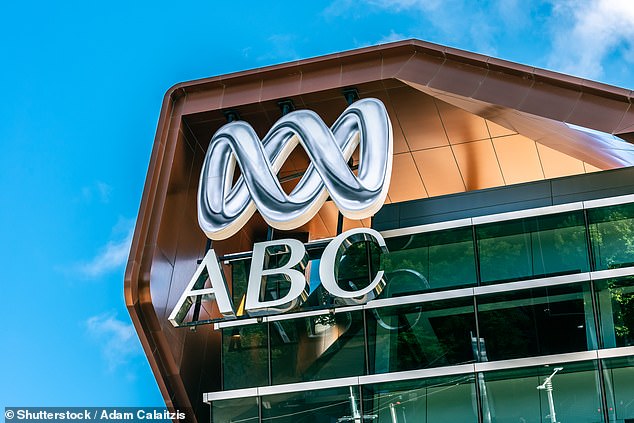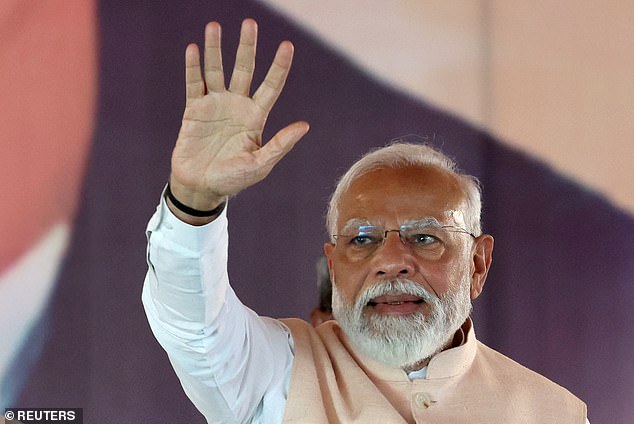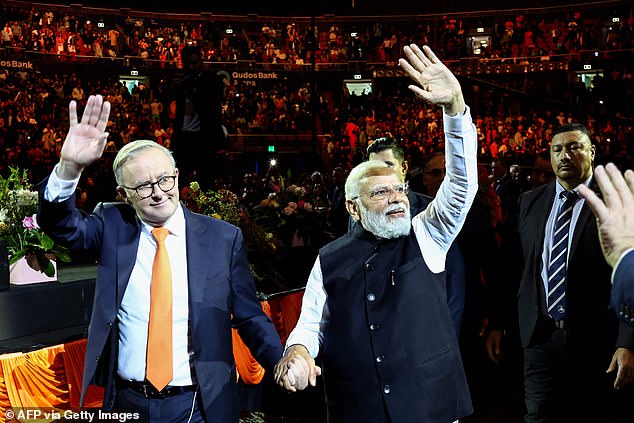Avani Dias: ABC journo ‘booted’ from one of Australia’s major trading partners after being told her reporting had ‘crossed a line’
An ABC journalist has been ‘forced’ to leave India after the government told her her reporting had ‘crossed a line’.
Avani Dias had been working as the South Asia bureau chief for the Australian National Broadcaster in India since 2021, but on Tuesday she claimed she had been effectively deported from the country for her reporting on New Delhi’s alleged involvement in the killing of a Sikh separatist leader . in Canada.
‘Last week I had to leave India abruptly. Modi government told me my visa extension would be denied,” she tweeted, referring to Prime Minister Narendra Modi.
‘After intervention by the Australian government, I was only given a two-month extension… less than 24 hours before my flight.’
In the elections in India, which started last week but last six weeks because the country is so large, Modi is aiming for a record third term in office.
Avani Dias (pictured) had been living in India since 2021 and working as ABC’s South Asia bureau chief, but on Tuesday she said she had been effectively deported.

Avani Dias had been living in India since 2021 and working as ABC’s South Asia bureau chief, but on Tuesday she said she had been effectively deported.
Dias said Modi’s Hindu nationalist Bharatiya Janata Party made it difficult for her to cover the election and other news.
“There is always a sense of unease that these kinds of reactions can come your way as a journalist in India,” she said in the latest episode of her podcast Looking for Modi.
“I’ve felt it the whole time I’ve been here. This also applies to my colleagues from various publications.’
In April, ABC’s Foreign Correspondent program featured an episode created by Dias in which she investigated the death of Sikh independence advocate Hardeep Singh Nijjar, whose murder in 2023 caused a huge rift between India and Canada.
Canadian Prime Minister Justin Trudeau said there were “credible allegations” that Indian government agents were linked to the June 18 killing, which took place in the parking lot of a Sikh temple near Vancouver.
Dias said she was not surprised when a clip from her Foreign Correspondent program in India was blocked on YouTube.
“If you try to watch it now on YouTube in India, it says, ‘This content is currently unavailable in this country due to a government order relating to national security or public order,’” she said on her podcast.
The reporter said similar stories from other publications had also been “removed.”
While waiting for her visa extension application, Dias received a call from “someone from the Indian ministry.”
She claimed that she was told that her “routine visa extension application would not be submitted and that I would have to leave the country within a few weeks.”
“He specifically said this was because of my Sikh separatist story saying ‘It had gone too far’.”
Dias said the caller even referenced her podcast, which “felt really jarring.”

Indian Prime Minister Narendra Modi (photo) is aiming for a record third term in office
“My partner and I have called this place home for the past two and a half years. This place we loved so much would no longer be our home, and we were forced to leave on the terms of the Indian government,” she said.
The Australian government lobbied on her behalf, resulting in Dias being granted a two-month extension just 24 hours before she was due to fly back to Australia.
But she said the rot had already set in. ‘It felt too difficult to do my work in India. I found it difficult to participate in public events of Modi’s party.
“The government wouldn’t even give me the passes I need for the elections, and the ministry left it all so late that we were already packed and ready to leave.”
The journalist said that the Indian authorities had deliberately made things difficult for her.
“Narendra Modi’s government has made me so uncomfortable that we have decided to leave.”
The ABC said Dias will continue to cover the elections in what is “the world’s largest democracy” from Australia.

Prime Minister Anthony Albanese (pictured left) hugged and held hands with Indian Prime Minister Narendra Modi (pictured right)
India is Australia’s sixth largest trading partner, with two-way trade in goods and services worth $46.5 billion in 2022.
In May 2023, Modi was greeted by 20,000 adoring fans at the Qudos Bank Arena in Sydney’s west.
Prime Minister Anthony Albanese – who hugged and held hands with Mr Modi – was joined by NSW Premier Chris Minns to welcome the Indian Prime Minister to the cheering crowd.
“The last person I saw on this stage was Bruce Springsteen… and he didn’t get the reception that Prime Minister Modi has received,” Albanese said.
‘Prime Minister Modi is the boss.’
